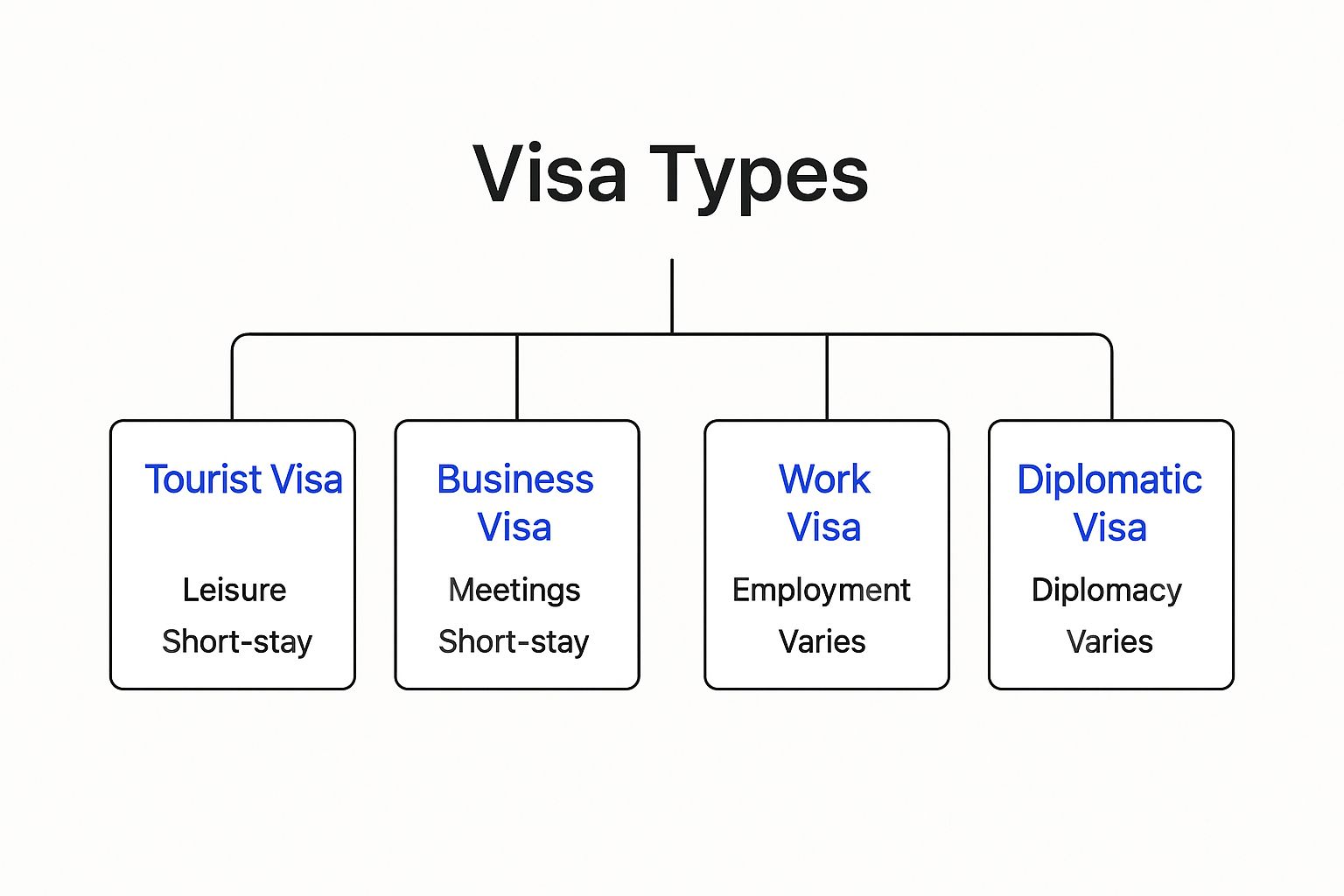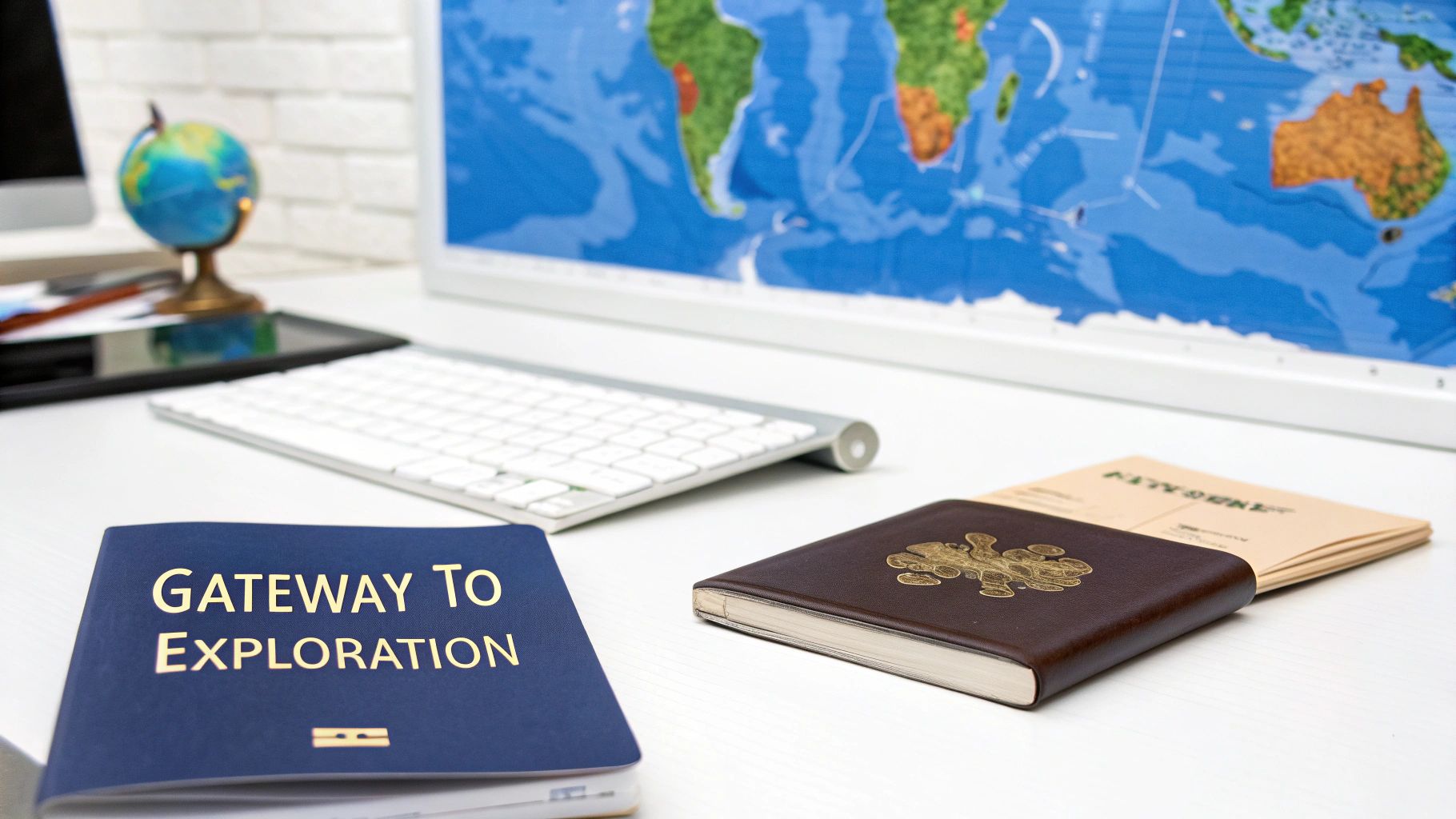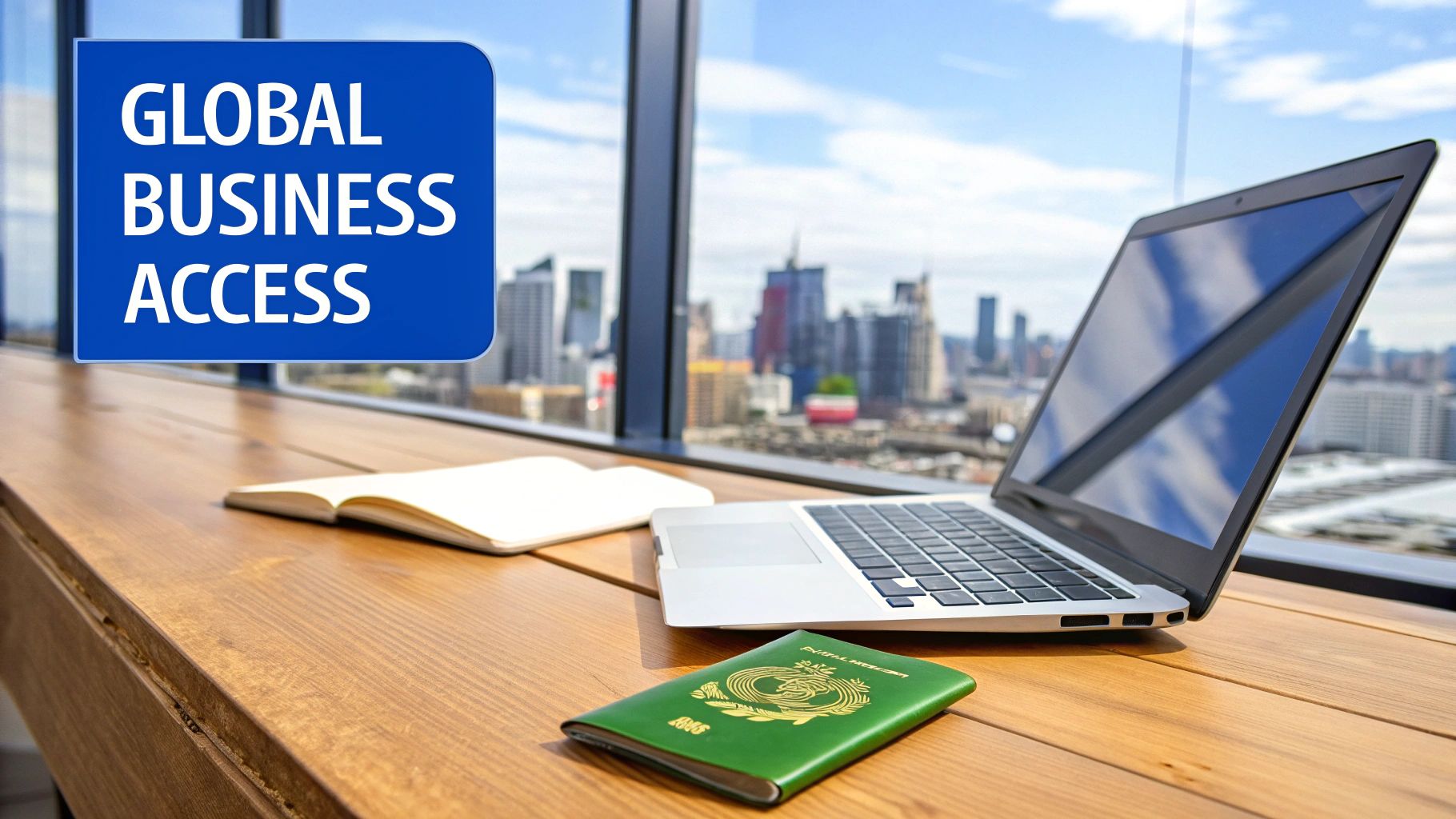What Are the 4 Types of Visa for Nigerians

Ready to travel the world? The first thing to get your head around is that most international travel authorisations for Nigerians fit into one of four main buckets: Tourist, Business, Work, and Diplomatic visas.
Essentially, a visa is just an official stamp of approval from the country you want to visit. Each one is created for a very specific reason, whether you're planning to 'japa' for work or just take a quick trip to Dubai.
Decoding the Four Main Visa Types
Before you even think about filling out forms, you need to be crystal clear on which type of visa you need. They all come with their own set of rules, eligibility criteria, and required documents.
Picking the wrong one is one of the most common—and frustrating—reasons for a visa application to be rejected. Getting this right from the very beginning will save you a world of time, money, and 'wahala'.

The infographic above breaks it down nicely, showing how each visa is tied to a specific intention—from a short holiday to official government business.
To give you a quick overview, here's a simple breakdown of these categories.
The Four Main Visa Types at a Glance
| Visa Type | Primary Purpose | Who It's For |
|---|---|---|
| Tourist Visa | Leisure, vacation, and visiting family or friends | Holidaymakers, sightseers, and individuals visiting loved ones abroad. |
| Business Visa | Professional activities like meetings, conferences, or negotiations | Business professionals, entrepreneurs, and conference attendees. |
| Work Visa | Long-term employment in a foreign country | Skilled workers, professionals, and individuals with a job offer. |
| Diplomatic Visa | Official government business or diplomatic missions | Diplomats, government officials, and their immediate families. |
This table helps you see at a glance which category your travel plans might fall into.
It's also worth noting that this system works both ways. Just as we need visas to go abroad, foreigners need them to come here. The Nigerian Visa Policy classifies visas for visitors into similar groups, including Diplomatic, Business, Tourist, and Temporary Work Permit Visas, each with its own entry requirements.
Whether you're planning a holiday in Ghana, attending a conference in the UK, or starting a new job in Canada, understanding these basic distinctions is the first and most crucial step in your journey. For a deeper dive into the specifics for a particular country, have a look at our detailed guide on the various UK visa types available to Nigerians.
Tourist Visas: Your Gateway to Exploration

Of all the visa types out there, the tourist visa is easily the most common. It's designed purely for leisure, family visits, and a bit of adventure. This is the visa you’ll need for that dream summer holiday in Dubai, a trip to see your sister in the US for Christmas, or to attend a close friend's wedding in South Africa.
Think of it as a temporary pass, a key that unlocks another country's culture, sights, and sounds. It lets you be a visitor, not a resident or an employee.
Understanding the Purpose and Limits
The main point of a tourist visa is right there in the name: tourism. This covers everything from sightseeing and recreational activities to simply visiting friends and family. But the limitations are just as important to understand. You are strictly forbidden from working or doing any kind of business while on a tourist visa. Earning money, even for a short time, is a serious violation that can have some pretty severe consequences.
A tourist visa grants you permission to spend money in a country, not to earn it. Getting caught working can lead to deportation and a ban on future travel, so it's a rule you absolutely must respect.
This clear line is why embassies are so meticulous in their checks. They need to be absolutely sure you're a genuine tourist who will follow their laws and head back home when your trip is over.
Key Eligibility Hurdles for Nigerians
For Nigerian applicants, consular officers tend to zoom in on two main areas. First, you have to prove you have enough money to cover your entire trip—we're talking flights, hotels, feeding, and 'flexing' money—without any need to work.
Second, and this is often the trickiest part, you need to show strong ties to Nigeria. This is just their way of saying you need to prove you have compelling reasons to return home. These ties can be things like:
- A stable, well-paying job.
- Family responsibilities, like a spouse and children.
- Property or other significant assets back in Nigeria.
- Ongoing studies or educational commitments.
Your application needs to tell a clear and convincing story of a visitor who has every intention of coming back to Nigeria. The best way to do this is to ensure everything is consistent across all your documents, from your bank statements to the leave letter from your employer.
Business Visas: Your Gateway to Global Opportunities

For Nigerian entrepreneurs, investors, and professionals, the business visa is the key that unlocks international connections. It's specifically designed for short-term trips where you need to handle professional activities abroad—as long as you aren’t earning a local salary.
Think of it like this: a business visa lets you fly to Germany to plan the building in a series of meetings. A work visa, on the other hand, would be for staying in Germany to physically construct the building. This is a crucial distinction. A business visa is all about collaboration, negotiation, and exploration, not employment.
What Can You Actually Do With a Business Visa?
This visa opens the door to a wide range of commercial activities. For instance, a tech founder from Lagos might use it to attend Web Summit in Lisbon, networking with potential investors. An Aba-based trader could travel to China to meet suppliers and negotiate better terms for their goods.
Here are some of the most common activities allowed:
- Attending conferences, seminars, or specialised workshops.
- Negotiating and signing business contracts.
- Meeting with potential business partners, investors, or clients.
- Conducting market research or sourcing for goods.
For Nigerian entrepreneurs eyeing the Middle East, this comprehensive guide to the Business Visa for Dubai is a great resource. Just remember, the visa is strictly for these temporary business engagements.
The golden rule of a business visa is this: you’re there to facilitate international commerce, not to join the local workforce. Your activities must primarily benefit your Nigerian company or career.
Proving Your Trip Is Legit: Key Requirements
To get your business visa approved, you have to convince the embassy that your trip is genuine. The single most important document is usually the letter of invitation from the company or conference organiser in your destination country.
You'll also need to provide solid proof of your professional standing in Nigeria. This could be your CAC business registration documents if you're a business owner, or an official letter from your employer detailing your role and the reason for your travel.
Most embassies will also ask for proof of sufficient funds to cover your trip and a confirmed return ticket. These documents show that you intend to come back home. For example, many countries grant an initial stay of up to 90 days on a business visa but strictly forbid employment, ensuring a balance between economic engagement and immigration control.
Work Visas: Taking Your Career International

For a lot of Nigerian professionals, landing a work visa feels like the ultimate 'japa' goal. It's the key to taking your skills global, but "work visa" isn't a single thing. It’s a broad category that can mean anything from a specific one-year contract to a skilled migration path that could lead to permanent residency.
But no matter the destination, all work visas are built on one fundamental requirement: a confirmed job offer. You can't just decide you want to work in another country; an employer there has to want your specific skills and agree to sponsor your application. This sponsorship is the first, and most important, piece of the puzzle.
The Employer's Role and Your Preparation
Let's take a real-world example. Imagine a Nigerian nurse who lands a position with the UK's National Health Service (NHS). The hospital becomes their sponsor, taking on a huge chunk of the visa paperwork. It's the same story for a software developer targeting Canada's Express Entry system – a valid job offer from a Canadian company can massively boost their chances.
While your future employer's role is vital, your own preparation is just as critical. You’ll need to assemble a comprehensive file of documents that prove you’re the right person for the job.
Think of it this way: your educational qualifications and professional experience are your currency. You have to present them clearly so that foreign immigration officials can instantly recognise their value.
This often involves getting your Nigerian degrees and diplomas assessed by a recognised body, like World Education Services (WES), to show how they compare to foreign qualifications. You'll also need to provide detailed reference letters and a solid record of your work history. If you're just starting out, our guide on how to apply for a work visa breaks down the practical first steps.
Understanding Points-Based Systems
Many of the most popular countries for Nigerian professionals, like Canada and Australia, use a points-based system to choose skilled workers. It's essentially a scorecard where you accumulate points based on your profile.
Here are the typical factors that earn you points:
- Age: Younger applicants usually get more points.
- Education: The higher your qualification (e.g., BSc, MSc, PhD), the more points you score, especially after it's been evaluated.
- Work Experience: The number of years you've spent in a skilled profession matters a lot.
- Language Proficiency: A high score in an English test like IELTS is non-negotiable.
- Job Offer: A pre-arranged job can give your total score a significant bump.
The aim is to score enough points to pass a certain threshold, which then gets you an invitation to apply for the visa. It’s a transparent method for countries to pick the candidates they believe will contribute most effectively to their economy.
A Look at Diplomatic and Official Visas
Finally, we arrive at the most specialised visas of all: Diplomatic and Official Visas. You won’t find an application form for these on VFS Global or at any visa centre. They’re granted exclusively to individuals who are officially representing the Federal Republic of Nigeria on the world stage.
This special category is all about making international relations and government-to-government business run smoothly. We're talking about high-ranking government officials, career diplomats, and the immediate family members joining them on an official assignment. A perfect example would be a Nigerian ambassador taking up a new post in Washington D.C., or a federal minister travelling to a United Nations conference in Geneva.
How Is This Visa Different?
This is where things really diverge from the other visa types we've covered. Your personal bank balance or proof of property back home simply doesn't come into it. Eligibility is tied completely to your official position and the government-approved purpose of your trip.
Instead of the usual public application route, the process for a diplomatic visa is a direct government-to-government affair. It's managed through Nigeria's Ministry of Foreign Affairs and the embassy or high commission of the country you're travelling to.
This direct channel is designed to cut through the red tape that ordinary travellers often face, ensuring that state business can be handled quickly and without friction. It's a fundamental tool of international diplomacy, not a pass for personal travel.
In short, if you're ever in line for one of these visas, you won't be searching online for how to get it—the official protocols of your government role will have already made it clear.
Your Top Visa Questions Answered
When you're planning a trip abroad, a million questions can run through your mind. It's a complex world out there, but let's clear up some of the most common worries that Nigerian applicants have.
Can I Work on a Tourist Visa?
Let's be blunt: absolutely not. A tourist visa is exactly what it sounds like—it's for tourism. Think holidays, visiting family, or exploring a new city.
Trying to work on a tourist visa is a serious violation of immigration laws. It's a fast track to getting deported and potentially being banned from that country for years. Always make sure your visa type matches your true intentions for travelling.
What's the Number One Reason for Visa Refusal?
Hands down, one of the biggest reasons for a visa denial is failing to prove you have strong "ties to your home country." This is a make-or-break part of your application.
Essentially, you need to convince the consular officer that you have solid reasons to come back to Nigeria after your visit.
What do they look for? Things like:
- A steady job with a consistent income.
- Close family members who depend on you, like a spouse or children.
- Property you own or a business registered in your name in Nigeria.
Inconsistencies in your application or not providing sufficient proof of funds are also major red flags. Your entire application, from your forms to your bank statements, must tell a clear and consistent story. A huge part of this is the interview itself; we've got a great resource to help you prepare for common visa interview questions and their answers.
Do I Really Need to Use a Travel Agent?
While a lot of people in Nigeria turn to agents for convenience, it's definitely not a requirement. You are perfectly capable of filling out and submitting your application on your own. Every form and guideline you need is publicly available on the official embassy or consulate website.
If you decide to go with an agent, choose a reputable one. But never forget, you are ultimately responsible for every piece of information submitted in your name.
"Always double-check every single page of your application before it's submitted, even if an agent prepared it. A small mistake can lead to a refusal, and the responsibility will be yours alone."
For those already in the U.S. who are looking to change their visa status or apply for a Green Card, the process can get incredibly complicated. This is where professional help is often necessary. Speaking with an adjustment of status attorney can make all the difference in navigating that journey successfully.
How Early Should I Apply for My Visa?
The simple answer? As early as you possibly can. Visa processing times are unpredictable and can change based on the country, the type of visa, and even the time of year.
As a general rule, aim to start your application at least three to four months before you plan to travel. For more complex visas, like those for work or settlement, you'll need to start much earlier. Your best bet is to always check the specific embassy's website for the most up-to-date processing times to avoid any last-minute stress.
Planning your journey abroad can be complex, but you don't have to do it alone. JapaChat is Nigeria's first AI immigration expert, designed to give you instant, accurate answers to all your visa and relocation questions. Start planning your move with confidence today. Sign up for free at JapaChat.

Leave a Reply